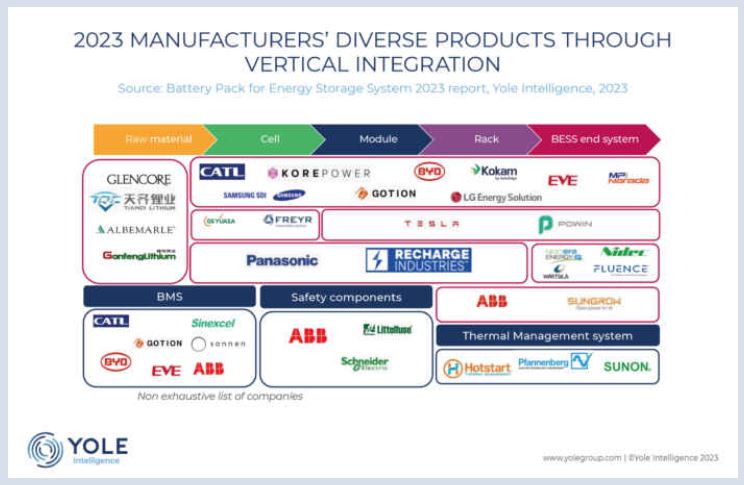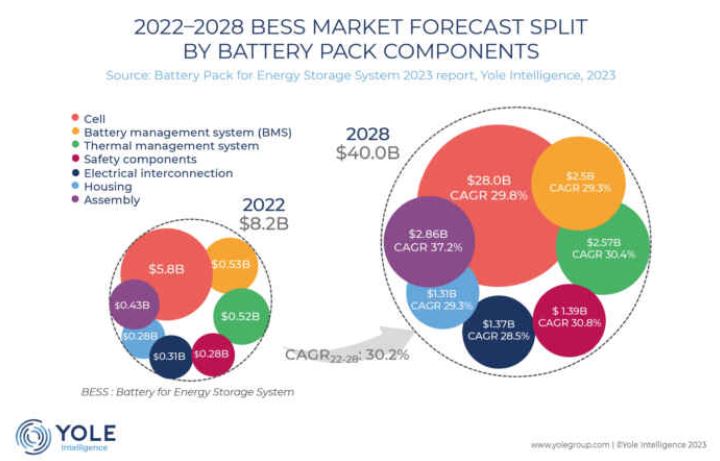Date: 18/08/2023
Li-ion battery packs to reach $40 billion at 30.2% CAGR 22-28
The total annual demand for battery packs in energy storage systems is projected to surge eight times (in GWh) by 2028.
OUTLINE
The total annual market for lithium-ion battery pack BESS is growing from around US$8.2 billion in 2022 to about US$40 billion, with a 30.2% CAGR 22-28.
Increasing energy capacity and power capability, lower cost, and better safety are the primary development areas of BESS battery packs.
As of 2022, Fluence, Tesla, Wärtsila, Powin, and NextEra Energy are the top BESS players.
The total annual demand in GWh for lithium-ion battery packs for residential, industrial & commercial, and utility-scale BESS will grow from 35.7 GWh in 2022 to around 283.8 GWh by 2028: about an 8-fold increase, announces Yole Intelligence’s analysts.
Demand will be driven mainly by utility-scale BESS applications, which will require a battery capacity of 258 GWh, representing 90 % of the total market in GWh by 2028. Residential BESS applications will follow with 5.5%, followed by industrial & commercial BESS applications.
In this dynamic context, Yole Intelligence has developed a dedicated technology & market report to provide market metrics and forecasts for battery packs for BESS for residential, industrial, and utility-scale applications. In its new Battery Pack for Energy Storage System 2023 report, the company, part of Yole Group, demonstrates the strong, consistently-growing potential for battery pack players. It illustrates the battery pack supply chain landscape and discusses market opportunities for players that supply materials, devices, or technology solutions to the lithium-ion battery pack industry. It provides insight into different technologies currently used in battery packs, their components, and related technology trends and includes different approaches to recycling end-of-life batteries.
Shalu Agarwal, Ph.D., Senior Analyst specializing in Power Electronics & Batteries at Yole Intelligence, Part of Yole Group said “The total annual market for lithium-ion battery packs (for residential, industrial & commercial, and utility-scale) BESS will grow from around 8.2 billion dollars in 2022 to about 40 billion dollars, with a 30.2% CAGR between 2022 and 2028.”

A significant portion of the global battery pack market for the segments studied in Yole Intelligence’s report (i.e., cells, battery modules & racks, battery management system, thermal management system, electrical interconnections, safety components, and housing) is the battery cell, representing around 70% of the total battery pack cost. Although the cell price ($/kWh) is decreasing, the overall cell capacity per pack is increasing, thus keeping the cell’s share of the cost within a battery pack high.
The battery pack for a battery energy storage system comprises a fixed number of lithium-ion cells wired in series and parallel within a frame to create a module. The modules are then stacked and combined to form a battery rack with various control and protection systems, such as battery management systems, thermal management systems, safety components, and electrical interconnections. No “standard” lithium-ion battery pack exists for battery energy storage systems, as different applications (e.g., residential, industrial, and utility-scale BESS) have different requirements. However, at least partial standardization would allow manufacturing cost reduction and is highly desired.
A lithium-ion battery pack’s performance depends on the battery chemistry, battery features (e.g., energy and power density, charge/discharge efficiency, calendar life, cycle life), and battery pack components. Regarding the various battery chemistries for BESS, the most common are lithium-NMC -oxide and cobalt-free LFP . However, LFP batteries dominate energy storage systems due to their lower cost, higher safety, and longer cycle life. Increasing energy capacity and power capability, lower cost, and better safety are the primary development areas of BESS battery packs.
News Source: Yole
Tweet Follow @ecewire

